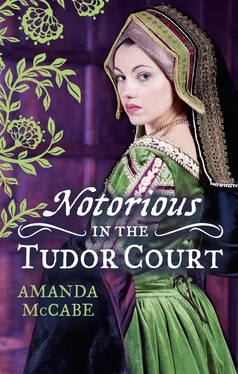That did not go at all as she planned.
Marguerite stalked along the garden pathway, her hands balled into tight fists against her skirts. She didn’t even feel the chilly breeze, for her cheeks burned hot! She hurried around the corner of one of the buildings, away from the better-travelled thoroughfares. No doubt her face was as red as it felt, and she did not want anyone commenting on her agitation.
Here, close to the kitchen herb gardens, there were only a few servants, maids and pages too intent on their own errands to question hers.
She sat down on a stone bench, drawing out a book and pretending to read as she drew in deep, steadying breaths. What a fool she was! She had sought Nicolai out to use her “charm,” her femininity, to beguile him, lull him into trusting her. Into telling her what his true errand was in England.
Instead, she came away far more beguiled than he could ever be.
When she went to that doorway in the theatre, she was determined to coldly draw him in. But she was brought up short by the vision of him balanced on that rope, so graceful and strong. He took feats that should have been impossible for any human body and made them appear effortless. He seemed to fly lightly through the air, as naturally as any bird.
Any bird of prey.
She stared, hardly daring even to breathe, as he leaped backwards, landing perfectly straight and unwavering on that flimsy rope every time. It was surely magic!
And she was swept away, her errand completely forgotten in the flurry of his movements, the musical flexibility of his body. She watched, completely mesmerised, out of all time, until he landed on the ground. He scarcely seemed even out of breath, and only when she drew near did she see the faint, glistening sheen of sweat on his bronzed skin, the tangle of his tumbled hair. He appeared golden all over, an ancient god flown down to earth.
Marguerite had met many men in her life, men with high opinions of themselves—some even deserved, by force of their great intellect, their fine looks or their artistry. Many who were fools, but never knew it. But never had she met a man who had her so entranced as Nicolai Ostrovsky. What was behind his lightness and ease, his lazy, graceful sensuality? What did he hide in those pale blue eyes?
She found she wanted his secrets, not to use as weapons, not to gain the power that secrets always bestowed, but just to know.
She lost her careful concealment in that little room, giving in to the force of her wonder and awe, her attraction for his glittering goldeness. Only for a moment, yet long enough to show her the graceful danger he posed.
When he offered to help her walk the tightrope herself, when he held his hand out to her, she was seized by such longing. Longing to feel the freedom he must know when he flew high above the sordid world. Longing for things she knew could never be hers.
She did avoid that temptation, the desire to feel the rope under her feet, his hand in hers. But she gave in to a darker desire—she actually touched his hair.
Marguerite groaned, burying her face in her book as she remembered that compulsion which would not be denied. That rush of need to feel the cool silk of his hair against her skin. Pressed close to him in that dim, dusty space, inhaling the scent of him, the green, herbal freshness of his soap overlaid by the salty tang of honest sweat, she had wanted nothing more than to wrap her arms around him, throw herself into his lap and kiss him, until they drowned in the hot tide of passion.
She remembered too well the taste of his mouth in Venice, the feeling of his lips on her body, those graceful fingers on her stomach, her breasts. He was surely as skillful in the arts of lovemaking as he was on that rope.
Yes, she lost herself for a moment, drowned in the force of that cursed Russian’s allure and charisma. Only Sir Henry’s arrival saved her, and she had to flee when she heard she was actually to be working with Nicolai!
“Idiot,” she muttered. She could not succumb to weakness now. There were yet long days ahead here in England, and she needed her wits and skills to see her through. She would not give in to the allure of a lithe body and golden hair.
Remember, he stole your dagger, she told herself sternly. She had to get it back, and find out what his business was among the Spanish.
She closed her eyes, envisioning a sheet of pure, white ice encasing her whole body, her mind and heart, erasing the heat and light of Nicolai Ostrovsky. When she opened them again, she felt calmer, more rational.
She lowered her book to her lap, hands steady. Passion, agitation, achieved nothing. Her feelings for Nicolai were a mere physical manifestation, her weak, womanly body clamouring for pleasure. Focusing on her work would soon overcome such foolishness.
Marguerite heard a burst of laughter, a flurry of chatter in Spanish, and she turned to see a group of ladies strolling toward her. At their head was the woman Nicolai sat next to at the banquet, the one with the sweet smile. That smile was in evidence now as she drew near Marguerite’s bench.
“Ah, señorita, are you alone this afternoon?” she asked. As she stopped before Marguerite, her dark red velvet skirts swaying in a cloud of violet scent, Marguerite saw she was older than she first appeared. Tiny lines fanned out from her brown eyes and her lips, and grey threaded her brown hair at the temples. She was obviously quite wealthy, too, with a heavy garnet-and-pearl cross around her neck, hanging low over her fur-trimmed surcoat, and pearl drops in her ears. An important member of the Spanish party, then, Marguerite decided. But her eyes were kind.
Marguerite stood up to make a curtsy. “I am reading, señora… ”
“This is the Duchess of Bernaldez,” one of her attendants said sternly.
The lady waved these words away. “Dona Elena when we are outdoors, if you please, Esperanza.” She whispered to Marguerite, “I have spent many years at a quiet convent, you see, and have yet to become accustomed to the strict etiquette my husband seems sadly to enjoy so much.”
Marguerite laughed in surprise. “I, too, prefer informality. I am Marguerite Dumas, Dona Elena.”
“I know. You are quite famous, Señorita Dumas.”
“Famous?” Oh, no. That would surely make things so much more difficult! It was hard enough to engage in subterfuge in a crowded Court without being well known.
“Of course. The men can talk of nothing but your rare beauty. I see now why that is so.”
“You are very kind.”
“I just speak as I find, and I must say I enjoy having beauty around me as much as anyone. It brightens these grey English days. Would you care to walk with us? We were going to take a turn by the river.”
Ah, an opportunity! They so rarely just fell into her lap like that. Hoping to compensate for her silly behaviour with Nicolai, Marguerite nodded and said, “I would be honoured, Dona Elena.”
She fell into step next to the duchess as they strolled around the palace to the long walkway that ran beside the Thames. The river was placid today, grey and flat as a length of sombre silk, broken only by a few boats and barges floating past on their way to London and the sea. Dona Elena’s attendants gradually went back to their conversations, their whispers like those waves that broke and ebbed along the banks.
“You have not long been married, then, Dona Elena?” Marguerite asked.
“A few months only. My first husband, a sea captain, died many years ago, señorita. I loved him a great deal, and when he was gone I sought the refuge of a convent. I thought to stay there for the rest of my life.”
Читать дальше












